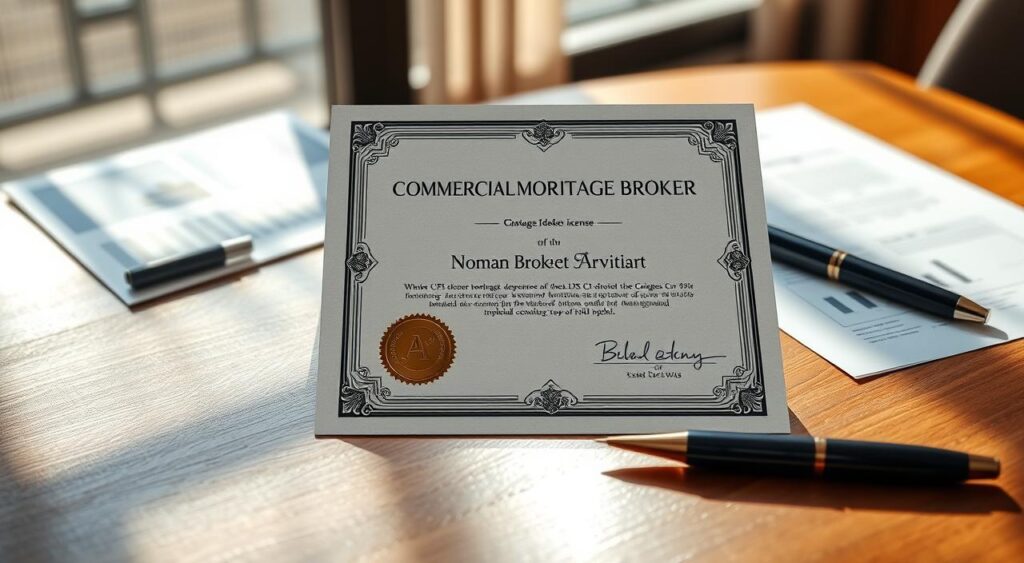Ever thought about being a commercial mortgage broker? This field is exciting, with big paychecks, regular hours, and lots of room to grow. But what’s the job like, and how do you get started? This guide will cover the basics, education, licenses, and future prospects for commercial mortgage brokers in the U.S.
Key Takeaways
- Commercial mortgage brokers help finance all sorts of commercial properties, like offices and factories.
- Their job is to find the right lenders for investors, earning commissions on each deal.
- To become one, you need a bachelor’s degree, pass the NMLS exam, get licenses, and keep learning.
- Top commercial loan brokers can make over $100,000, with chances to move up and specialize.
- Building a strong network is key to finding clients and deals.
What is a Commercial Mortgage Broker?
A commercial mortgage broker helps get commercial mortgage loans started. They act as a middleman between buyers or investors and lenders. Their main jobs include gathering needed documents, making sure clients qualify, and building client relationships for future work. They also follow state rules for the mortgage company.
Responsibilities and Duties of a Commercial Mortgage Broker
Commercial mortgage brokers do many things, such as:
- Getting documents from clients, like financial statements and loan forms
- Checking if clients meet loan requirements
- Keeping client relationships strong for more business
- Knowing and following state laws for mortgage deals
Commercial Mortgage Broker vs. Home Loan Broker
Commercial and home loan brokers help with mortgage loans, but they differ:
- Commercial brokers work on loans for business properties, like offices and stores. Home loan brokers help with loans for homes.
- Commercial brokers look at the property’s income and the borrower’s business cash flow. Home loan brokers use a standard process to find the right loan.
These differences show how commercial and residential properties have different needs and financing options.
Steps to Become a Commercial Mortgage Broker
Becoming a commercial mortgage broker is a rewarding career. It offers many opportunities in real estate finance. To start, you must follow a few key steps. Let’s look at what you need to do to become a successful broker.
- Meet the Educational Requirements: First, get the education needed. Enroll in courses on federal law, ethics, and non-traditional mortgage lending. This will get you ready for the next step.
- Pass the SAFE Mortgage Loan Originator Test: Next, pass the SAFE Mortgage Loan Originator Test. This is a key step for commercial mortgage brokers.
- Register with the Nationwide Multistate Licensing System & Registry (NMLS): Then, register with the NMLS. This is a system that keeps track of mortgage industry licenses and registrations.
- Apply for a State-Issued Mortgage Broker License: After NMLS registration, apply for a state mortgage broker license. This varies by location and may need extra steps.
- Maintain and Renew Your License: Lastly, keep your license up to date. Make sure to meet all renewal requirements and keep learning through more training and education.
The journey to becoming a commercial mortgage broker may seem tough. But with hard work and determination, you can have a fulfilling career. You’ll have the chance to make a real difference in real estate finance.
“The commercial real estate finance field requires a better understanding of math compared to selling real estate, along with persuasive skills.”
Remember, becoming a commercial mortgage broker isn’t always easy. The field is competitive, and newbies often face challenges in their first year. Keep going, keep learning, and be open to change. These will help you succeed.
Educational Requirements
To be a successful commercial mortgage broker, you need to meet certain educational goals. You can start with a high school diploma or GED. Many have a bachelor’s degree in finance or related fields. Some even have a master’s degree.
Getting a degree in finance or a related field can boost your career. It teaches you about financial principles, market analysis, and loan origination. These skills are key for success in this field.
| Educational Requirement | Benefit |
|---|---|
| High school diploma or GED | Minimum requirement to enter the field |
| Bachelor’s degree in finance, business, or economics | Improved job prospects and earning potential |
| Master’s degree in a related field | Demonstrates advanced expertise and knowledge |
To become a licensed mortgage loan originator, you must pass the SAFE Mortgage Loan Originator Test. This test makes sure you know how to work in the industry.
“Over 80% of businesses fail due to cash flow problems, highlighting the critical role of commercial loan brokers in helping small businesses access funding.”
With the right education and a dedication to learning, you can succeed in this field. It’s a dynamic and rewarding career path.

Pre-Licensure Education
To become a licensed commercial mortgage broker, you must first complete a pre-licensure education program. This step is key to starting your career in the industry.
Enroll in Pre-Licensure Class
The pre-licensure class is about 20 hours long. It covers important topics like federal laws, state mortgage laws, broker ethics, and financial regulations. You must finish this education to take the NMLS exam, the next step in getting your license.
Pass NMLS Test
After finishing the pre-licensure education, you need to pass the NMLS exam. This exam tests your knowledge of state guidelines, mortgage practices, and regulations. You must score 75% or higher on both the state and federal parts of the exam.
The NMLS exam is tough, with only 57% of test-takers passing on their first try. To boost your chances, use NMLS practice tests and study materials to prepare well.
| Requirement | Details |
|---|---|
| Pre-Licensure Class | Covers essential topics like federal laws, state mortgage laws, broker ethics, and financial regulations. Typically 20 hours long. |
| NMLS Exam | Covers state guidelines, mortgage practices, and regulations. Passing score of 75% or higher required on both state and federal portions. |
| Exam Pass Rate | Only 57% of test-takers pass the NMLS exam on their first attempt. |
By finishing the pre-licensure education and passing the NMLS exam, you’re on your way to becoming a licensed commercial mortgage broker. You’ll be ready to assist clients with their financing needs.

Registration and Licensing Process
After finishing your education and exams, you need to register and start your mortgage broker business. This step is different in each state. You’ll usually need to register your business name and location with the state’s licensing office.
Register/Establish Mortgage Broker Business
When you register your business, think about how you want to work. You can offer services online, in a physical office, or both. Some states might ask for a physical office.
Apply for Broker License
After your business is registered, apply for your broker license. You’ll need to meet NMLS requirements, pay fees, get a surety bond, and submit your application.
The bond amount varies by state. It shows you’re a credible mortgage professional and protects customers.
| State | Effective Date of Commercial Financing Disclosure Law |
|---|---|
| Virginia | July 1, 2022 |
| California | December 9, 2022 |
| Utah | January 1, 2023 |
| Florida | July 1, 2023 |
| New York | August 1, 2023 |
| Connecticut | January 1, 2024 |
| Georgia | January 1, 2024 |
| Kansas | July 1, 2024 |
Recently, several states have introduced commercial financing disclosure laws. This changes the rules for commercial mortgage brokers. It’s important to keep up with these updates.

“Starting a commercial mortgage broker business and getting the right licenses is key to entering this field. The rules vary by state, but with the right help, you can register commercial mortgage broker business, establish commercial mortgage broker business, apply for commercial mortgage broker license, and get commercial mortgage broker license.”
Maintaining and Renewing Your License
Keeping your commercial mortgage broker license up-to-date is key. You need to know the latest in mortgage lending and finish required courses each year. This keeps your skills sharp and your clients happy.
To renew your license, you must show you’ve done your continuing education. You’ll need to prove you’ve completed at least 24 hours of courses in two years.
Having a current license is important. It shows you’re committed to your clients and the industry. You can offer the latest knowledge and services.
Renewing Your Commercial Mortgage Broker License
The renewal process for commercial mortgage brokers is straightforward:
- You’ll get a renewal notice about 60 days before your license expires.
- You can renew online or by mail. Online renewals are quick and available anytime.
- Make sure to fill out the renewal form correctly and pay the fee.
- Mail renewals might take up to 6 weeks to process.
Not meeting the education requirements can lead to losing your license. So, it’s vital to keep up with your education and finish the required credits on time.
“Maintaining a current and compliant commercial mortgage broker license is crucial for providing clients with the most up-to-date industry knowledge and regulatory information.”
By following the right steps to maintain and renew your license, you keep your business thriving. This ensures you can continue to serve your clients well.

Continuing Education and Training
Getting your commercial mortgage broker license is just the start. To keep up and serve your clients well, you need to keep learning. This means taking part in ongoing education and training.
It’s key to grow your knowledge of the industry and the laws that govern it. You can do this by taking online or in-person classes. These will keep you current with the latest in commercial real estate financing.
Don’t forget to work on your business skills and how you interact with clients. Classes on communication, negotiation, and managing client relationships are a must. These skills will help you handle the complex world of commercial mortgages and impress your clients.
Keeping up with commercial mortgage broker continuing education and additional training is more than a duty. It’s a chance to stand out and prove you’re a reliable, knowledgeable broker.
“Continuous learning is the minimum requirement for success in any field.” – Brian Tracy

| Course | Duration | Price |
|---|---|---|
| Commercial Real Estate Financing Fundamentals | 20 hours | $99 |
| Advanced Commercial Mortgage Structuring | 16 hours | $149 |
| Navigating Commercial Real Estate Regulations | 12 hours | $79 |
Investing in your commercial mortgage broker continuing education and additional training boosts your skills. It shows you’re dedicated to top-notch service. This dedication can set you apart in the competitive world of commercial mortgage brokerage.
How to Become a Commercial Mortgage Broker in Texas
To become a commercial mortgage broker in Texas, you need to meet certain educational and licensing requirements. Let’s look at the steps to get a license in the Lone Star State.
Educational Requirements in Texas
In Texas, you must complete 23 hours of pre-license education from the Department of Savings and Mortgage Lending. Or, you can take 20 hours from the Office of the Consumer Credit Commission. You also need to finish an NMLS-approved 20-hour SAFE Act pre-licensing course.
NMLS Exam and Application Process in Texas
After you finish your education, you must pass the NMLS SAFE Mortgage Licensing exam. This exam has 120 questions and lasts 190 minutes. It costs $110. To apply for your license, you’ll need to submit business info, formation documents, credit reports, background checks, and financial statements.
Fees and Maintaining License in Texas
The licensing process in Texas includes several fees. These include the NMLS processing fee of $30, FBI background check fee of $36.25, and a credit report fee of $15. You’ll also pay application fees of $225 (TX-OCCC) or $190 (TX-SML). To keep your license, you must take 8 hours of continuing education each year. You also need to renew your license every November 1st.
By following these educational, exam, and licensing steps, you can start a fulfilling career as a commercial mortgage broker in Texas.
“Commercial mortgage loans can range from one year to a maximum of 15 years, while residential mortgages can span up to 25 or even 30 years in the United States.”
How to Become a Commercial Mortgage Broker in California
To become a commercial mortgage broker in California, you must go through a detailed licensing process. This includes meeting educational and experience needs, passing exams, and following state rules for mortgage lending.
The journey starts with registering on the Nationwide Multistate Licensing System (NMLS). You’ll need to pass exams, get bonds, and keep up with continuing education to keep your license.
Educational and Experience Requirements
In California, commercial mortgage broker hopefuls must meet certain requirements:
- Finish a 20-hour NMLS S.A.F.E. pre-licensing course
- Complete extra courses from the California Department of Financial Protection & Innovation (DFPI) or the California Department of Real Estate (DRE)
Licensing and Exam Process
Next, you’ll need to pass the SAFE Mortgage Loan Originator (MLO) national exam. It has 120 questions (115 scored) to be done in 190 minutes. The exam costs $110.
Depending on your license type, you might also need to pass the National and California State parts of the SAFE Test or the National Test Component with Uniform State Content.
Aspiring commercial mortgage brokers in California must also get surety bonds. These bonds cost between $25,000 and $50,000, based on your license type. The licensing and processing fees are $400.
It’s important to stay compliant. Commercial mortgage brokers must keep up with continuing education and report any changes in their business or personal info to the right authorities.
By going through the detailed licensing process, you can start a career as a commercial mortgage broker in California. You’ll help businesses and investors in the fast-paced real estate market.
how to become a commercial mortgage broker
To become a commercial mortgage broker, you need to follow a few key steps. First, you must have a bachelor’s degree in finance. This degree gives you the knowledge to handle the complex world of commercial real estate financing.
Then, you must take a pre-licensure class and pass the Nationwide Mortgage Licensing System (NMLS) exam. This step is crucial to get the right license to work as a broker. After passing, you’ll register your business and apply for your state license.
- Meet the educational requirements, typically a bachelor’s degree in a finance-related field.
- Enroll in a pre-licensure class and pass the NMLS exam.
- Register your mortgage broker business.
- Apply for your state-issued broker license.
But your journey doesn’t stop there. You must keep your license by taking annual continuing education. Staying updated with the latest trends and rules is key to serving your clients well.
“Commercial Mortgage Brokers typically earn between $100,000 and $150,000 annually.”
The rewards of being a commercial mortgage broker are great. With 30 million small businesses needing funding, there’s a lot of work to be done. This career can lead to six-figure incomes, making it very appealing.
Also, many lenders offer programs for business loan brokers to grow their client base. As commercial lending grows, so do the chances for commercial mortgage brokers. This makes it a promising career for those with the right skills and commitment.
Best Commercial Loan Broker Training Courses
Aspiring commercial mortgage brokers have many respected training courses to choose from. These programs cover key topics like loan origination, structuring, and packaging. They also teach about developing a lender network, marketing, and following regulations.
Top courses are offered by ICS Loans, the Commercial Loan Broker Institute, Mortgage Training Center, and Commercial Capital Training Group. They aim to help new brokers start their careers quickly. Both online and in-person learning options are available to fit different learning styles.
- ICS Loans offers a Commercial Mortgage Finance Video Program for $499, which covers essential topics for commercial loan brokers.
- The Commercial Loan Broker Institute provides an Intermediate Commercial Mortgage Training course for $299, as well as an Underwriting Commercial Mortgage Loans training for $199.
- The Mortgage Training Center has a Commercial Mortgage Brokerage Course priced at $30, and a Fee Collection Training Video and Mortgage Broker Fee Agreement for $199.
- The Commercial Capital Training Group offers a comprehensive Commercial Mortgage Marketing Course for $199, as well as a Combo Package deal for $249.
These training programs give aspiring commercial mortgage brokers the knowledge and tools they need. By investing in quality education, individuals can set themselves up for a fulfilling career in this dynamic field.
“A successful mentorship program significantly contributes to business success, as reported by most successful business owners.”
Having a mentor is crucial for commercial loan brokers aiming for success. Many top training programs offer ongoing support and resources. This includes custom branding, marketing tools, and access to leads, to help new brokers succeed.
Why Become a Commercial Loan Broker?
Being a commercial loan broker comes with many benefits. One big plus is the chance to earn high commissions from big commercial real estate deals. These deals are often much bigger than those in the residential market. Plus, commercial brokers usually work regular hours, unlike those in residential real estate.
There’s more to it than just the money. You can grow your career and specialize as you get more experience. You can choose to work for a big firm or go solo, giving you freedom. This freedom lets you tailor your services to what your clients really need, making your job very rewarding.
| Benefit | Description |
|---|---|
| High Earnings Potential | Commercial real estate deals are often larger in scale, leading to higher commissions for brokers. |
| Regular Business Hours | Commercial brokers typically enjoy more standard work schedules compared to residential brokers. |
| Career Advancement | Opportunities for specialization and growth as you gain experience in the industry. |
| Flexibility and Independence | Brokers can work for established firms or operate their own businesses, offering customized services. |
Mission Peak Brokers has a 99% loan closing rate. They do this by doing thorough checks and making sure clients get the financing they need. This shows how much impact a commercial loan broker can have on a business. It also makes for a fulfilling career.
“The key to success as a commercial loan broker is having a passion for the job, receiving the necessary training, building and maintaining client relationships, possessing a strong work ethic, and partnering with the appropriate lending institutions.”
Conclusion
Becoming a commercial mortgage broker is a rewarding career for those interested in finance and real estate. You need to meet educational, licensing, and training requirements to succeed. The journey, from getting your license to staying compliant, may seem tough. But with hard work and dedication, you can achieve financial success and grow your career.
The world of commercial mortgage brokers is exciting and challenging. Brokers must keep up with market trends, lending rules, and changes in regulations. Yet, those who invest in their skills and build strong relationships can thrive. They can offer competitive rates, negotiate better terms, and connect borrowers with lenders.
If you’re starting or looking to switch to this field, you need to be dedicated and always learning. Embrace the challenges and opportunities in this industry. By doing so, you can become a trusted advisor, helping your clients and securing your own success in commercial real estate finance.
FAQ
What is a commercial mortgage broker?
A commercial mortgage broker helps set up loans for commercial properties. They act as a middleman between buyers and lenders.
What are the responsibilities and duties of a commercial mortgage broker?
Their main job is to gather needed documents and check if clients qualify for loans. They also build client relationships and follow state rules.
How do commercial mortgage brokers differ from home loan brokers?
Commercial brokers deal with business properties, while home brokers help with residential homes. Commercial brokers consider more factors when choosing a loan.
What are the steps to become a commercial mortgage broker?
First, you need to meet education requirements. Then, take a pre-licensure class and pass the NMLS test. Next, register your business and apply for a license. Finally, keep your license up to date with ongoing education.
What are the educational requirements to become a commercial mortgage broker?
Most have a bachelor’s degree in finance or a related field. Some have a master’s degree. But, a high school diploma or GED can also qualify you.
What is the pre-licensure education process for commercial mortgage brokers?
The pre-licensure class is about 20 hours. It covers federal laws, state mortgage laws, and ethics. After this, you can take the NMLS exam.
How do you pass the NMLS exam?
The NMLS exam tests your knowledge of state and federal laws. You need a 75% score to pass. It’s tough, so prepare well with practice tests.
What is the process for registering and obtaining a commercial mortgage broker license?
The process varies by state. You’ll need to register your business and meet NMLS requirements. Pay fees, get a surety bond, and submit your application.
How do you maintain and renew your commercial mortgage broker license?
Stay updated on mortgage laws and complete required courses each year. When renewing, show proof of your education.
What additional training and education is recommended for commercial mortgage brokers?
Take extra classes to learn more about commercial real estate financing. This will help you serve your clients better.
What are the specific requirements for becoming a commercial mortgage broker in Texas?
In Texas, you need 23 hours of pre-license education. You must also pass the NMLS SAFE Mortgage Licensing exam. Then, apply for your Texas license.
What are the requirements for becoming a commercial mortgage broker in California?
California requires education and experience. You must register with the NMLS, pass exams, and get bonds. Keep up with state regulations through ongoing education.
What are the best commercial loan broker training courses available?
ICS Loans, the Commercial Loan Broker Institute, and others offer great training. They cover loan origination, structuring, and more. These courses help you start your career.
What are the advantages of becoming a commercial loan broker?
You can earn high commissions, advance in your career, and have regular hours. These are big benefits of being a commercial loan broker.

